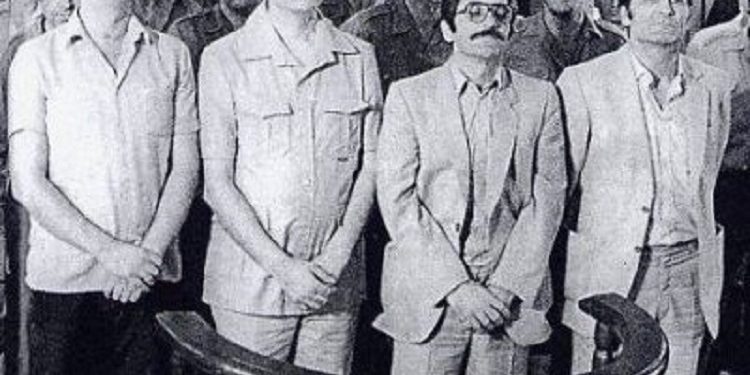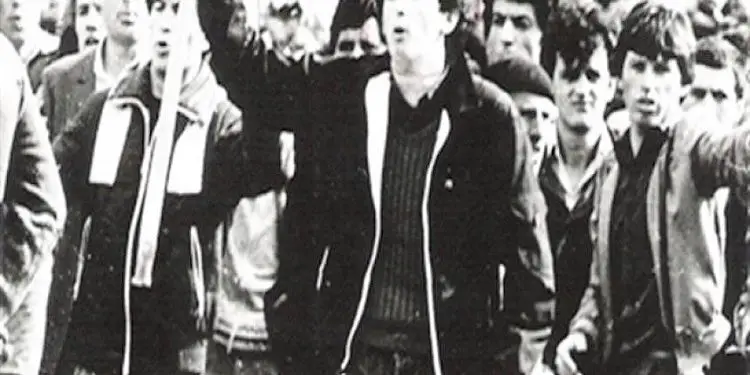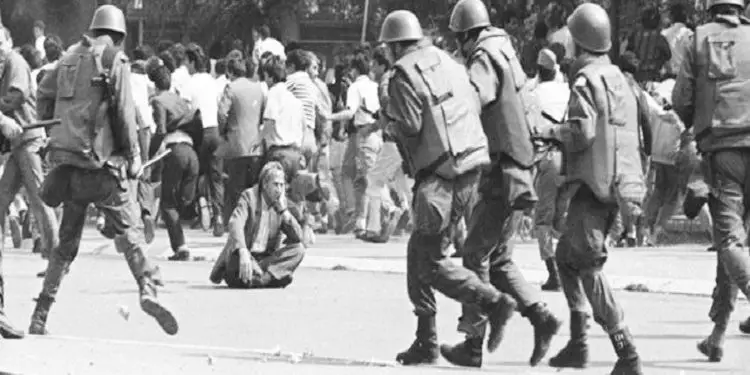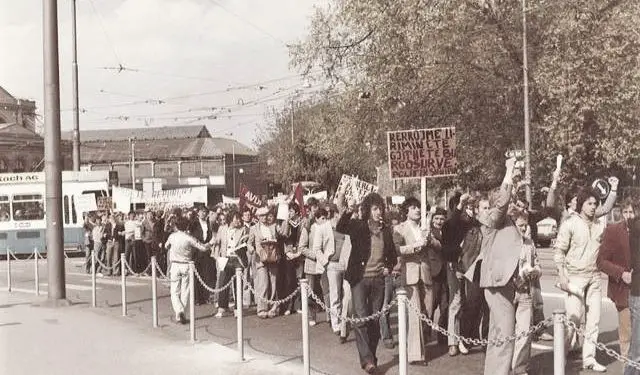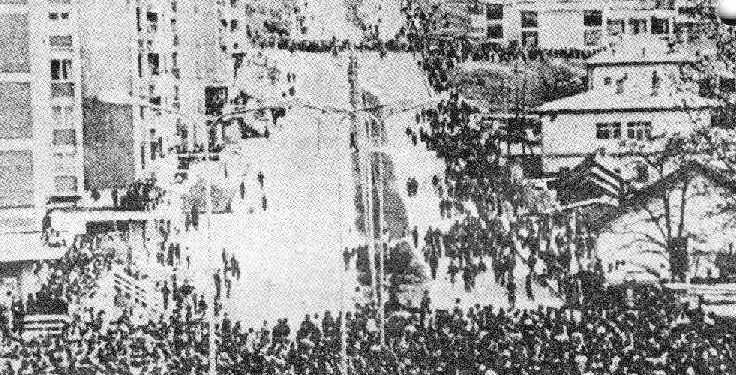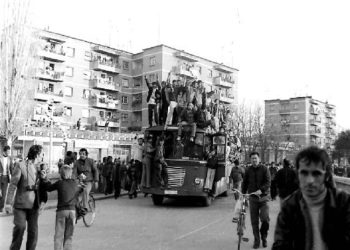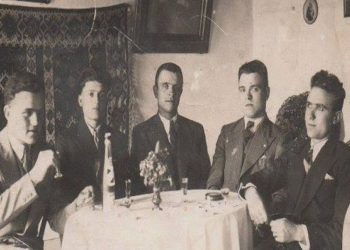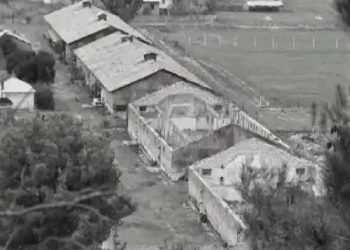By Sheradin BERISHA
Part two
– Persecution, Imprisonment, and Persecution of Albanians in Kosovo, Macedonia, and Montenegro by the Tito Regime, 1948–1968 –
Memorie.al / In June 1948, following the escalation of political relations between Belgrade and Moscow, the Communist Party of Yugoslavia was expelled from the organization of communist state parties, the “Cominform” (Informbyro), and consequently, relations between the USSR (Union of Soviet Socialist Republics) and its allies with AVNOJ’s Yugoslavia were broken. In this situation, Albania sided with the Cominform organization, and its retention of pro-Soviet positions led to the deterioration of the “good” relations it had with the Federal People’s Republic of Yugoslavia since 1945.
Continued from the previous issue
February 20, 1958: The District Court in Pejë, with the judicial panel Iso Omeragiq (President of the District Court in Pejë), lay judges Pavle Armush, Mirko Spasiq, and Shaqir Zogaj, and minute-taker Stojana Vukoviq, an employee of this court, based on the indictment KTO no. 95/57, “in the name of the people,” sentenced:
Muhamed Brovina to 12 years of hard imprisonment,
Adem Krasniqi to 7 years of hard imprisonment,
Gjon Shtufaj to 7 years of hard imprisonment,
Besnik Koçi to 9 years of hard imprisonment, and
Hidë Dobruna to 5 years of hard imprisonment. (Verdict K. no. 149/57).
November 19, 1958: For the first time, the UDB imprisoned the patriot Adem Demaçi, with the justification that; “he acted hostilely against the state and social order of the FPRY (Federal People’s Republic of Yugoslavia), and was committed to the secession of the territory of Kosovo and its unification with Albania.” The indictment was prepared by UDB agents: M. Mihajlloviq, Momçillo Çanoviq, Vojisllav Mihajlloviq, with the testimonies of Albanian witnesses: F. G., D. M., A. A., Z. C., etc., while it was executed by prosecutor Radovan Bullajiq and deputy prosecutor, Mirosllav Llazareviq.
Based on the indictment PPQ no. 14/59 on 19.02.1959, at the District Court in Prishtinë, by the judicial panel Dragutin Kallugjeroviq and lay judges: Mehmed Kalaveshi, Riza Voca, and Qazim Bajgora, the trial against Adem Demaçi was held on March 17, 1959. According to Article 117, paragraph 1 of the Penal Code (LP), and according to Article 16, paragraph 1 of the Penal Code (LP), he was sentenced “in the name of the people” to 5 years of hard imprisonment.
February 1959: According to indictment K. no. 29/59 dated 19.02.1959, the following were tried at the District Court in Prizren: Aziz Spahiu, Hasan Berisha, Reshat Hadri, and Durak Pasuli.
Illegal Political Groupings (1950s)
In the 1950s, several illegal political groupings, following the program of the LNDSH (National Democratic Albanian Movement), were also active in Kosovo and other ethnic areas. These were:
- “Vatra Kosovare Nacional-Demokratike Shqiptare” (VKNDSH) – Albanian National-Democratic Kosovar Hearth;
- “Grupi Demokratik Shqiptar, Kosova” (GDSHK) – Albanian Democratic Group, Kosovo;
- “Grupi Shqiptar Revolucionar i Maqedonisë” (GSHRM) – Albanian Revolutionary Group of Macedonia;
- “Grupi Demokrat-Indepedent Shqiptar i Kosovës” (GDISHK) – Albanian Democrat-Independent Group of Kosovo;
- Group – “Veteranët e Luftës Shqiptare – Rezistenca Malësore (GVLSHRM) – Albanian War Veterans – Highlands Resistance;
- ”Shoqëria Demokratike Shqiptare ‘Ismail Qemali’(SHDSH- “I.Q”) – Albanian Democratic Society ‘Ismail Qemali’;
- Lidhja e Vardarit – Besa Demokratike Shqiptare (LV-BDSH) – Vardar League – Albanian Democratic Pledge; and
- Lidhja Shqiptare e Sharrit (LSHSH) – Albanian League of Sharr.
In the summer of 1960, the LNDSH group, “Votra Kosovare Nacional-Demokratike Shqiptare”, led by Shahin Voca from Shala e Bajgorës, was discovered. This organization was founded on August 6, 1952, where its activity initially developed in the Mitrovica Gymnasium and the Stantërg school, only to spread within a short time to Prishtinë, Besianë (formerly Podujevë), Gjilan, Prizren, Shkup and Tetovë, Pejë, Burim (formerly Istog), etc. Within 8 years, the “VK-NDSH” organized 387 loyal members within its ranks.
Upon discovery by the UDB, 21 members were arrested and sentenced. Of these, 4 were sentenced by the Military Court of Zagreb.
The District Courts in Prishtinë and Prizren sentenced “in the name of the people” 17 members of this group, including: Ragip Sadiku, Bajram Gashi, Hasan Rexha, Bislim Fazliu, Muharrem Hyseni, Luz Pacolli, Nuhi Preteni, Bilall Rama, Hilmi Badallaj, Ali Isufi, Rraman Jashari, Ramë Dibrani, Niman Shala, Sinan Sinani, Musli Rexhepi, Ibrahim Metaj, and Niman Kajtazi. Meanwhile, in Zagreb, on 25.02.1961, based on Verdict no. IK 21/60, the military court sentenced: Emin Fazliu to 8 years of hard imprisonment, Baki Dullov to 2 years and 6 months, Mehmet Trepça to 2 years, and Hilmi Ajvazi to 9 months of hard imprisonment.
The Revolutionary Committee for the Unification of Albanian Territories (1960-1961)
In the continuation of illegal political organizations and Albanian resistance generally, at the beginning of the 1960s, three intellectuals of that time organized: Kadri Halimi, Ali Aliu, and Ramadan Hoxha, who had already experienced suffering in Goli Otok and other Yugoslav dungeons in 1952 and 1954. These three patriots, feeling in their soul the daily suffering inflicted upon Albanians outside the borders of London’s Albania, did not want to remain idle. Thus, in May 1960, after a series of meetings, they decided to establish an illegal organization, which, after expanding on the ground, they temporarily named – “Komiteti Revolucionar për Bashkimin e Tojeve Shqiptare në Jugosllavi – me Shqipërinë” (KRBTSHJSH) – “The Revolutionary Committee for the Unification of Albanian Territories in Yugoslavia – with Albania.”
In January 1961, after the consolidation of its ranks and preparations for various actions, the UDB, through Albanian informants, discovered and arrested several members of the organization. Arrests of members of this organization began on January 25, 1961, in Gjilan, Preshevë, Ferizaj, Prishtinë, and Shkup. To evade arrests, two leaders of the organization, Ali Aliu and Ramadan Hoxha, went underground for more than two months, taking refuge in numerous bases in the villages of Lipjan, Shtimje, Suharekë, Gjilan, Preshevë, and Karadak. However, in early April 1961, due to treasonous circumstances, Aliu Aliu and Ramadan Hoxha were arrested in the village of Maxherë in Karadak, and on April 2, they were brought to the Prishtinë Prison.
The UDB imprisoned 32 members of this organization and brutally interrogated and mistreated hundreds of other Albanians.
After the completion of investigations, all those arrested were sentenced in the district courts of Prishtinë, Gjilan, and Vranjë in Serbia. In Prishtinë, where the trial was held from 14-19. IX. 1961 – the chairman of the judicial panel was Tahir Ibrani, and the prosecutor was Ramo Vodopiq, a Muslim from Montenegro. The trial was held exactly on the days when the Founding Conference of Non-Aligned States was taking place in Belgrade.
In these trials, the following were sentenced:
Kadri Salimi – 7 years and 6 months of hard imprisonment,
Ali Aliu – 8 years,
Ramadan Hoxha – 8 years,
While those sentenced to 1 to 5 years of hard imprisonment included: Hasan Dumani, Zenel Hajrizi, Beqë Heta, Hyrije Hana, Sheh Tefik Mustafa, Zeqir Hajrizi, Banush Ademi, Enver Tali, Mulla Nuredin Xhemajli, Sadri Imeri, Nuredin Aliu, Haki Agushi, Ali Xhelili, Amir Gashi, Mafak Ahmeti, Ramiz Ahmet-Cernica (delegate of the Prizren Conference-1945, where he strongly opposed the reoccupation of Kosovo by Serbia-my note), Ilmi Ferizi, Favzi Aliu, Selman Hasani, Ramadan Rexha (former prisoner-our note), Tefik Haxhiu, Jahi Ajeti, Hetem Ajdini, Asllan Marevci, Jetish Depca, Miftar Mustafa, Sabri Marevci, Bajram Kokolari, and Zahir Sakipi.
The Revolutionary Movement for the Unification of Albanians (1963-1964)
In 1963-’64, the symbol of Albanian resistance, Adem Demaçi, formed: “Lëvizjen Revolucionare për Bashkimin e Shqiptarëve“ (LRBSH) – “The Revolutionary Movement for the Unification of Albanians” and within it, the Prishtinë Committee, the Pejë Committee, and the Gjakovë Committee operated. The LRBSH had carried out many national activities during this period, but in June 1964, the UDB discovered the activity of this organization and began a fierce campaign of arrests. After three months of intensive investigations (over 500 Albanians passed through the hands of the UDB) and over 80 members of the LRBSH were brought to trial in small groups.
The second trial against the founder of the LRBSH, Adem Demaçi, and 11 other accused, was held on August 27, 28, 29, and 31 and September 1, 1964, at the District Court in Prishtinë. The judicial panel consisted of the court chairman – Tahir Ibrani, Judge Radomir Stojkoviq, and lay judges: Hazir Haziri, Tefik Shala, and Nebih Qena. The prosecution was represented (through indictment Kto-no. 223/64) by Mirko Matoviq – the public prosecutor of the Prishtinë District.
In this marathon trial, the following were sentenced “in the name of the people”:
- Adem Demaçi – Law faculty student, from Prishtinë, with 15 years of hard imprisonment.
- Sabit Ratkoceri (1939) – Graduate jurist (Lupç i Poshtëm) with 11 years.
- Hazir Shala (1934) – Normal School Professor, (Barilevë) with 13 years.
- Seladin Daci (1933) “musician at Radio Prishtina” (Prishtinë) with 10 years.
- Azem Beqiri (1939) – Employee of the Provincial Health Protection Institute (Prishtinë) – with 10 years.
- Abdullah Lahu (1944) – 4th-grade student of the Normal School, with 10 years.
- Ahmet Haxhia (1932) – Blacksmith from Prishtinë, with 10 years,
- Xhafer Mamuxhiku (1935) – Employee from Prishtinë, with 11 years,
- Dibran Bajraktari (1939) employee from Prishtinë – with 13 years,
- Sabri Novosella (1943) – Tailor from Prishtinë, with 9 years,
- Tefik Sahiti (1930) – Nurse from Prishtinë, with 9 years, and
- Njazi Straja (Saraxhoglliu) (1933) merchant from Istanbul, born in Prishtinë, was sentenced to 9 years of imprisonment.
Meanwhile, the following members of the LRBSH were also sentenced to 3 to 15 years of hard imprisonment:
(68 names are listed, mostly without sentences; only place of origin is noted. The list is translated as follows, noting the names as provided in the original text):
Adem Rukiqi, Abdyl Shala, Arif Hoxha, Arif Ymeri, Asim Vula, Avni Lama, Bahtire Berisha, Bahtir Duraku, Bedrush Çollaku, Besnik Koci, Destan Miftari, Din Spahia, Ejup Kastrati, Elhame Shala, Emina Rakovica, Enver Gerguri, Enver Mehmeti, Fazli Grajçevci, Fehmi Elmazi, Ferat Ymeri, Gani Msutafa, Haki Bejta, Haki Gashi, Hamdi Obertica, Hilmi Rakovica, Hyda Dobruna, Hysen Bukoshi, Hysen Daci, Ibrahim Stublla, Ismet Koshutova, Isuf Istrefaj, Isuf Isufi, Kadri Kusari, Myrteza Nura, Mustafë Venehari, Nezir Gashi, Nimon Podrimja, Mejreme Berisha, Osman Berisha, Qerim Zajmi, Ramadan Lahu, Ramadan Shala, Rashit Rusha, Rexhep Elmazi, Rexhep Shala, Remzi Baloku, Rrustem Morina, Sabit Lahu, Sadik Latifi, Sahit Sfeqla, Selatin Novosella, Selman Berisha, Sylejman Gashi, Sylë Shala, Shefqet Jashari, Shemsi Hoxha, Shemsi Rudari, Tahir Shala, Teki Dervishi, Ukshin Shala, Vesel Bislimi, Vesel Shala, Vezir Zka, Ymer Mehmetaj, Zeqir Agushi, Zeqir Gërvalla, Zeqir Heretica, Zeqir Shala.
The 1968 Demonstrations
On November 27, 1968, a group of students led by Osman Dumoshi organized nationwide demonstrations in Prishtinë and several other cities in Kosovo. This group, which operated according to the LRBSH program, was arrested, and after four months of investigations, a trial was held against them at the District Court in Prishtinë on April 2, 3, 4, and 7, 1969. The judicial panel included: Nazmi Juniku – chairman, with lay judges: Beqir Shehi and Mehmet Sponca, the minute-taker was Hysamedin Oruçi, and the Prosecutor was Sahit Meraku, delegated from Pejë.
This panel of judges – lay judges, on April 7, 1969, “in the name of the people,” for the “crime of hostile propaganda, under article 118 al. 1 of the Penal Code (KP),” found these students guilty and sentenced them to a total of 37 years of hard imprisonment. On this occasion, the students:
- Osman Dumoshi, Hasan Dërmaku, Selatin Novosella, and Adil Pireva were sentenced to 5 years of imprisonment each;
- Skënder Kastrati and Xheladin Rekaliu to 4 years of imprisonment each;
- While Ilaz Pireva, Skënder Muçolli, and Afrim Loxha were sentenced to 3 years of imprisonment each.
- For active participation in the Prishtinë demonstration, the following students were also sentenced: Asllan Kastrati, to 6 months; Sylejman Kastrati to 3 months; Skënder Berisha to 2 months, Bedri Novosella, Sylejman Peposhi, and Halil Qosja, to 1 month each; while Tefik Qitaku and Ramadan Ramadani (both tailors), were sentenced to 2 months of imprisonment each.
- For the Ferizaj demonstration, the following were sentenced: Ali Mehmeti, teacher, to 1 year; Ismet Ramadani and Hasan Abazi (both students), to 10 months each; while those sentenced to 1 month each were: Beqir Qerimi, student, and the students: Sylejman Bytyqi, Hasan Muhaxheri, and Ekrem Beqiri.
- For the Gjilan demonstration, the student: Irfan Shaqiri, was sentenced to 1 year, while those sentenced to 1 month each were: Beqir Qerimi, student, and the students: Rexhep Mala, Fatmir Salihu, Ahmet Hoti, etc.
- Meanwhile, for the Besianë (formerly Podujevë) demonstration, the following were sentenced: Hamit Abdullahu (barber), to 6 months (likely 1 year and 6 months); Sabit Syla (student), to 1.4 months (likely 1 year and 4 months); Haki Sheholli to 1 year; while those sentenced to 1 month each were: Hasan Sh. Shala and Bahri Shabani, both students. Also sentenced to 1 month each was the teachers: Hasan Shala, Xhafer Ejupi, Skënder Hoxha, Shaqir Shala, and Selatin Vokrri, as well as Nexhip Ejupi and Abdulla Nishevci, both tailors by profession.
The Tetovë Demonstration (1968)
On December 22, 1968, another demonstration was organized in Tetovë. For the Tetovë demonstration, which actualized the issue of using the Albanian flag and opening classes in the Albanian language, 170 Albanians were sentenced, while 54 people were sentenced to over 1 year of imprisonment, not only from Tetovë but also from Shkup, Gostivar, Strugë, and Kërçovë. Only in the courts of Tetovë and Shkup, “for criminal offense against the state,” the following were sentenced:
- Mehmet Myrtezani – Gega, teacher, to 7 years;
- Faik Mustafa, student, to 5 years;
- Abdylselam Selami, teacher, to 6 months (likely 1 year and 6 months);
- Ramadan Sinani, student, to 2 years;
- Fehmi Rifati, student, to 2 years;
- Abdylmenaf Rystemi, student, to 2 years;
- Hysni Qemal Sherifi, teacher, to 6 months (likely 1 year and 6 months);
- Refki Murati, mason, to 2 years;
- Nexhmidin Neziri, teacher, to 6 months (likely 1 year and 6 months);
- Ibrahim Rudi, student, to 3 years;
- Agim Jaka, student, to 6 months (likely 2 years and 6 months);
- Hysenxhevat Kalaishta, student, to 5 months;
- Xhemil Mustafa, student, to 5 months;
- Arbër Xhafëri, student, to 3 months;
- Agim M. Xhaferi, student, to 3 months of imprisonment, and many others.
At that time, following the arrests in Tetovë, the Macedonian chauvinist power imprisoned and sentenced many young Albanians who had not participated in the Tetovë demonstration. In Shkup, Sejdi Kryeziu was sentenced to 5 years for allegedly carrying out hostile propaganda for the secession of Western Macedonia and its unification with Albania, while Inajet Bariu was sentenced to 1 year for hostile propaganda. In Strugë, Irfan Vlashi was sentenced to 6 years for subversion, Tosun Roçi to 4 years, while in Kërçovë, Syrja Qura, Sali Ramadani, etc. were sentenced.
The Goli Otok Prison Camp
Albanian prisoners spent the hardest years of their sentences in the prisons of Idrizovë and Veles, in Macedonia; of Niš, in CZ of Belgrade, and Požarevac… in Serbia; of Titograd in Montenegro; of Bileća, Stara Gradiška, Lepoglava… and especially in the synonym for Dante’s hell, “Goli Otok” (Naked Island), an island in the northeastern Adriatic in Croatia. In this barren, sharp-stoned island, Albanian prisoners, and not only them, experienced the Golgotha, the most terrible days of their lives. The accounts of many Albanian prisoners who passed through the hell of Goli Otok testify to a savage and cruel treatment, unprecedented in the history of humanity.
The goal was clear: not only physical harm but also the complete spiritual breakdown and destruction of every prisoner. The beating of prisoners among themselves was practiced there (old prisoners would beat the new prisoners coming to this infamous camp until they fainted or died). After the heavy and grueling work they did during the day, the prisoners were forced every evening to pass through the living cordon of penitent prisoners and frenzied UDB agents…! In Goli Otok, therefore, prisoners with broken and tarnished character (the most immoral types) not only “self-governed” the entire camp but also became executioners of those who had an unbreakable human character. This infamous prison-camp also became the grave of many prisoners, including many Albanians. Memorie.al





